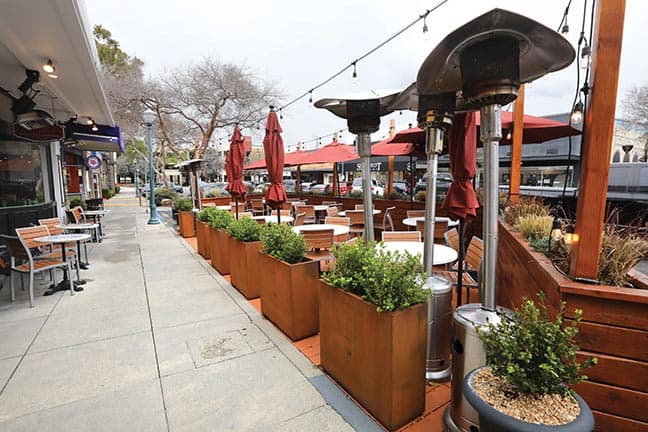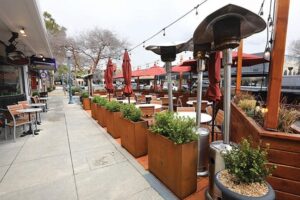Council ends ‘parklet’ program but expands outdoor dining

by Steven Felschundneff | steven@claremont-courier.com
Two days after Governor Gavin Newsom ended California’s COVID-19 state of emergency, the Claremont City Council pulled the plug on a familiar pandemic era sight, giving restaurateurs 14 days to remove outdoor dining “parklets” in the Village.
By a 5-0 vote, the council gave city staff the green light to expand outdoor dining options on public sidewalks and courtyards, but elected not to authorize a permanent parklet program to replace the temporary measure that was enacted at the beginning of the pandemic.
For those unfamiliar, parklets are temporary outdoor dining structures, usually built over parking spots, which popped up all over the country during the pandemic. Now that the official Covid emergency has ended, many municipalities are faced with how to end temporary programs while balancing the sometimes conflicting interests of business owners.

Seen above is the parklet at Aruffo’s Italian Cuisine. Courier photo/Steven Felschundneff
In June 2020, the City Council approved the construction of temporary parklets through its al fresco program, which provided Claremont’s many restaurant owners a way to continue to operate during the ban on indoor dining. The parklets were initially authorized for just three months but the council agreed to three extensions, finally deciding last April to sunset the program on February 28, 2023.
Many restaurateurs have enjoyed the increased seating afforded by the parklets, however, the structures have caused strife among other business owners who have complained about lost revenue due to the lack of parking adjacent to their storefronts.
Ultimately, four parklets were erected in the Village, including at Aruffo’s Italian Cuisine, Pizza N’ Such, House of Pong and a shared parklet for 42nd Street Bagel and Viva Madrid. The parklets cover 17 parking spots in the Village, all located on Yale Avenue and Second Street.
A handful of other outdoor dining areas constructed on private property will not face removal under Tuesday’s decision, but the owners must apply for a conditional use permit within 90 days.
“It is important to note that the Claremont Al Fresco program was approved under emergency conditions and existing parklets may not meet standards related to design, safety, construction, and Americans with Disabilities Act (ADA) access that a permanent program may require,” Assistant City Manger Jamie Earl wrote in a staff report.
The City of Claremont conducted a survey last month to gauge interest and seek guidance in structuring an outdoor dining program. Among responses to the 1,111 surveys submitted by business owners, residents, and visitors, 75% were in favor of a permanent program and “felt that outdoor dining options were necessary in a post-COVID-19 environment.” However, many respondents expressed concern about the lack of parking in the Village and the impact a permanent program could have on available spaces.
During public comment, Valerie Aruffo, owner of Aruffo’s Italian Cuisine, said she has a longstanding permit with the city for limited outdoor seating but that before Covid, it was largely decorative.
“People have generally never dined on the tables [in front], it’s more of a waiting area,” she said, “But it does look cute on the outside of the restaurant.”
She conducted a survey of her customers, who overwhelmingly supported keeping the parklets.
“We are definitely on board and just waiting to see what you guys are going to require because we want to make them safe as well for our customers and our employees,” Aruffo said.
Council members Jed Leano and Jennifer Stark favored an option that would have expanded outdoor seating on sidewalks and courtyards and explored the options for a permanent parklet program.
Stark said whatever decision the council came to, it was not going to make everyone happy. She cited a comment she received from one constituent comparing the parklets to homeless encampments, while another loved the al fresco program, saying that dining outdoors made Claremont feel like Paris.
Later in the meeting, Stark characterized permanent parklets as an opportunity to reimagine the use of public land beyond housing cars for free.
However, parking killed the possibility of a permanent program with Mayor Ed Reece and council members Sal Medina and Corey Calaycay, all of whom expressed concerns about limiting the number of spaces in the Village, which they all agreed had a parking problem. Calaycay, in particular, said he would not support any resolution that included a reduction in parking.
“The public policy discussion, as some of you will recall, before Covid, was charging for parking in the Village because of the parking problem that we have. And we got push back from people not wanting to charge for parking. Now we have taken away parking spaces. It may not be a large number, but nonetheless, we have still taken away parking space in a situation where we still hear from people acknowledging that we have a parking challenge,” Calaycay said.
Reece asked city staff if all 59 restaurants and food retailers in the Village could apply for a parklet if the council approved a permanent program. Katie Wand, assistant to the city manager, admitted that was a possibility, adding that applications would be taken on a first-come, first served-basis.
Reece then asked what would happen if all the restaurants received approval for parklets. Wand replied that could not happen because there would be a limit to the number of parking spaces that could ultimately be covered over for dining.
This struck Reece as an inequity issue, in which the first few applicants would get parklets, while future restaurateurs would be shut out.
The current outdoor dining program is fairly restrictive, allowing for minimal placement of tables on sidewalks or other public areas. With the council’s direction, city staff will reconfigure the program to allow for expanded dining areas and additional tables. That plan would have to go through the planning commission before implementation.
A restaurant owner who has a dining area on a sidewalk would apply for a special outdoor use permit, which comes with a long list of requirements due to its location in a public right-of-way. This includes, among other restrictions, that seating does not interfere with the flow of foot traffic or create a safety hazard, that the area must be supervised by employees, and fixtures must be kept in good condition. In addition, all fixtures must be brought indoors when the restaurant is closed.
Outdoor dining areas on private property would need a conditional use permit, which may include fewer restrictions than those on public land but still requires the area be safe, well maintained, and generally not an impediment to others who use the space.
With the exception of the parklets, which must be removed in two weeks, the owner of any business with an outdoor dining area that was expanded or created under the al fresco program would have 90 days to apply for a permit.
The council did leave the door open for a parklet program to become reality at some point, with a plan to bring the issue up during its priorities workshop in January 2024.







0 Comments